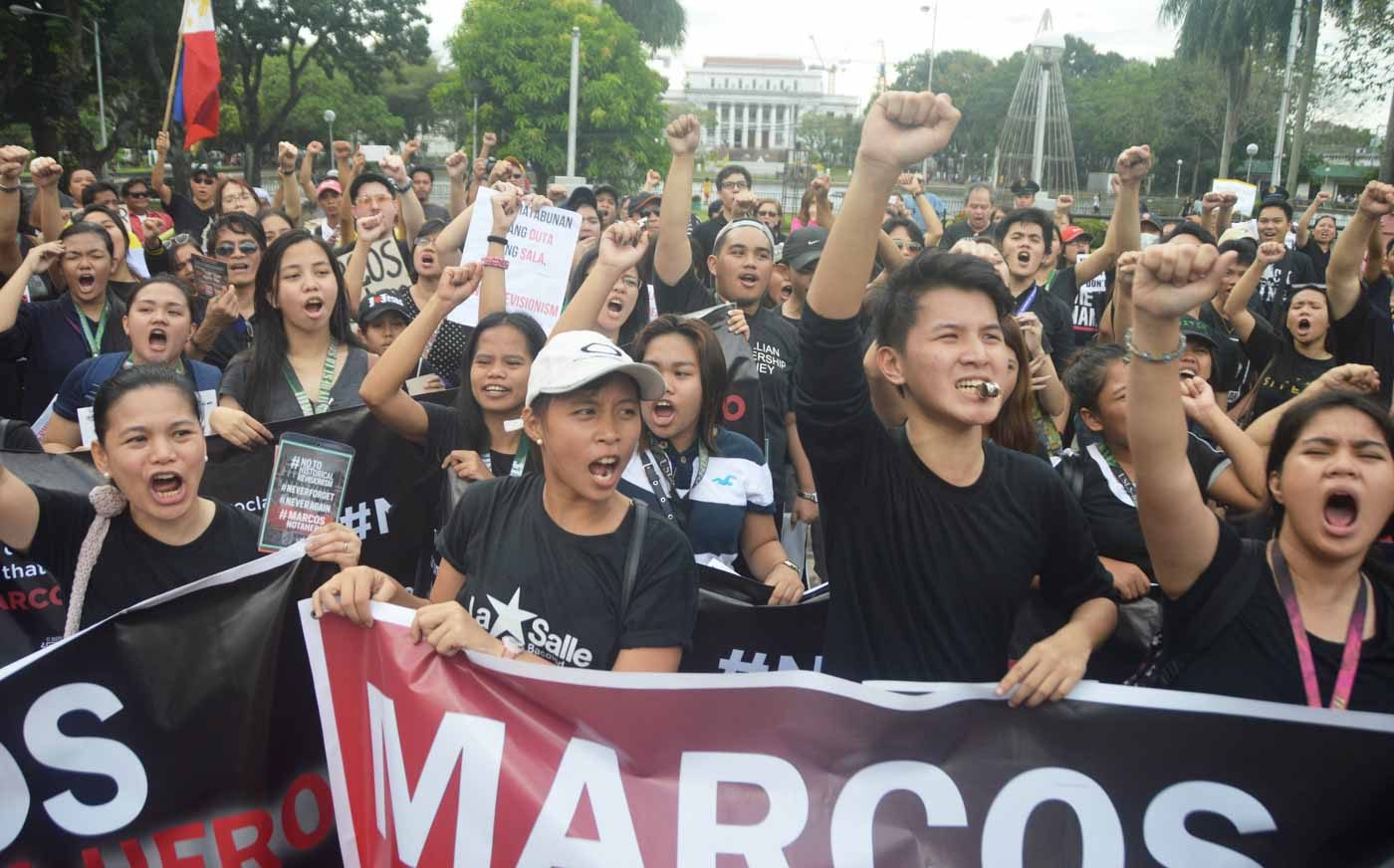SUMMARY
This is AI generated summarization, which may have errors. For context, always refer to the full article.

BACOLOD CITY, Philippines – Students of the University of St La Salle (USLS) here gave up their holiday on Wednesday, November 30, to march on the streets here and express indignation over the hero’s burial of the late dictator Ferdinand Marcos.
The gathering coincided with Bonifacio Day, a national public holiday to commemorate the birth of national hero Andres Bonifacio.
About 300 protesters, mostly millennials, marched from the USLS grounds to Redemptorist Church, where students expressed outrage over the abuses during Martial Law.
They then held a noise barrage along Lacson Street, urging the motorists to honk their car horns in protest of the Marcos burial.
The La Sallians – students, faculty, staff, and alumni – culminated their protest at the Capitol Park and Lagoon.
Speaking before the crowd, Brother Manuel Pajarillo, USLS president and chancellor, said he is thankful for seeing the students at the rally, as it meant that they care for their future.
He said the youth today “listen, and there’s a certain demand for intellectual honesty relative to historical truth.”
“This is a millennial thing,” he added.
‘Honor the victims’

“We’re holding this gathering in honor of those who died, were tortured, were illegally detained [during the Martial Law], and to our people who are still paying the foreign debts that Marcos borrowed. [This is] in honor of them, it’s our vow not to forget them, it’s our vow never again that this situation will be happening in our time,” Pajarillo said, adding that the dictator’s family claimed he is a hero when he’s not.
He said: “I hope this is just the beginning. To the rest of the Philippines, Negros will not allow it.”
In an interview, Pajarillo said that the late President Corazon Aquino and the Edsa Revolution had a lot of support in Negros Occidental.
“I think we need to have some spark, some catalyst to action. Rather than [being] silent and waiting, it’s there,” he said.
He stressed that Andres Bonifacio was the true hero, not Marcos: “It’s almost an insult to our intelligence and conscience to think that the burial this dictator who was overthrown out of power equated with other heroes.”
He said that “it’s incumbent upon academic intuition to contribute to the building of knowledge and teaching of historical truth.”
He added: “We must never forget history. The government must be accountable and transparent. It must also represent the people’s best interest.”
Meanwhile, about 50 militants also staged an anti-Marcos protest at the Fountain of Justice.
In another part of the city, hundreds of supporters of President Rodrigo Duterte staged their own rally to defend him. The anti-Marcos protesterts across the country on Wednesday sent a strong message to make the President accountable for ordering a hero’s burial for the dictator.
Negros during Martial Law
Negrenses also rallied on November 25 to protest the hero’s burial for Marcos.
In August, members of Negros Occidental-based civil society organizations urged President Rodrigo Duterte to rescind his order for a hero’s burial for Marcos, saying this would not promote national healing but would only create deeper fissures among Filipinos.
“In Negros alone, thousands suffered from unjust incarceration and merciless tortures by Marcos soldiers and paramilitary. Priests, nuns, farm workers, church workers, and anyone who stood for human rights were labeled as ‘communists’ and abducted, tortured, and/or killed in the most brutal manner,” they said then.
The Philippine Sugar Commission and its trading subsidiary, the National Sugar Trading Corporation (Nasutra), run by Marcos cronies, pushed sugar planters deep into debt. By 1984, over 190,000 workers lost their jobs and about 1 million people experienced famine in Negros Occidental, the group said, citing a report from the Los Angeles Times. – Rappler.com
Add a comment
How does this make you feel?
There are no comments yet. Add your comment to start the conversation.